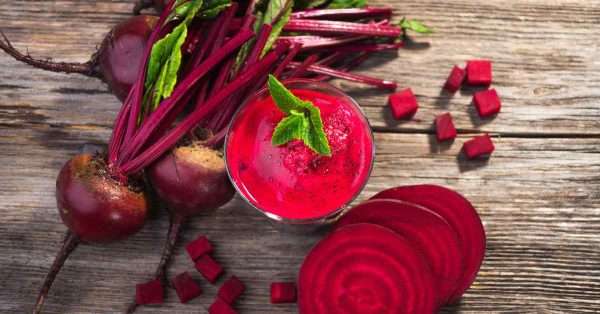Introduction
Beetroot has been recognized as a superfood in natural health and wellness, boasting many health benefits. While no direct research establishes a link between beetroot and pain relief, its rich nutritional profile suggests potential benefits that could indirectly contribute to pain management. This article delves into the potential of Beetroot for pain as a natural option.
The Nutritional Powerhouse: Beetroot

Beetroots are a treasure trove of essential nutrients such as fiber, folate (vitamin B9), manganese, potassium, iron, and vitamin C. They also contain a high concentration of nitrates, compounds that enhance blood flow and reduce blood pressure. Improved circulation can alleviate certain pain types, particularly inflammation, and swelling.
Beetroot may potentially help with the following types of pain:

- Inflammation-related Pain: Beetroot’s potent anti-inflammatory properties can help reduce inflammation, often linked to pain. Beetroot possesses potent anti-inflammatory properties, primarily due to the presence of phytonutrients like betalains. These compounds can help mitigate inflammation in the body. The anti-inflammatory properties of Beetroot could help with conditions like arthritis, where inflammation causes joint pain and stiffness.
- Pain associated with High Blood Pressure: Beetroot has nitrates, which can improve blood flow and lower blood pressure. High blood pressure can cause headaches and chest pain, so Beetroot may help relieve these symptoms indirectly.
- Exercise-induced Muscle Pain: Some studies suggest that beetroot juice can reduce muscle soreness and promote faster recovery after exercise. This is likely due to its nitrate content, which improves blood flow, and its antioxidant properties, which help repair cell damage.
- Neuropathic Pain: While there’s no direct research on Beetroot and neuropathic pain, Beetroot’s high concentration of essential nutrients, including B vitamins, could potentially contribute to neuropathic pain relief. B vitamins support nerve health, which could benefit those suffering from neuropathic pain.
- Oxidative stress is linked to various types of chronic pain. Beetroot is a rich source of antioxidants known to combat oxidative stress. Beetroot could potentially reduce pain and discomfort associated with conditions like arthritis, where oxidative stress plays a significant role.
Additional health benefits of Beetroot:
- Improved Digestive Health: Beetroot is high in dietary fiber, which promotes a healthy digestive system. It can aid in improving digestion, preventing constipation, and maintaining a healthy weight.
- Boosted Immunity: Beetroot is rich in vitamin C. This powerful antioxidant helps boost your immune system and protect your cells from damage. It also aids in absorbing iron, another essential nutrient found in Beetroot.
- Enhanced Athletic Performance: Some studies suggest that the dietary nitrates found in Beetroot can improve athletic performance by enhancing oxygen use and reducing fatigue. Beetroot could help athletes and those engaging in physical activities manage pain and recover faster.
- Support for Liver Health: Beetroot contains betaine, a compound that helps protect the liver from toxins and reduces inflammation. Beetroot could contribute to overall wellness and pain management by optimizing the body’s detoxification process.
- Improved Brain Health: The nitrates in Beetroot may improve mental and cognitive function by increasing the dilation of blood vessels and promoting blood flow to the brain.
Remember, while Beetroot has many potential health benefits, consuming it as part of a balanced diet and not relying on it as the sole treatment for health issues is essential. Always consult with a healthcare provider for personalized medical advice.
Precautions to consider:
- Beeturia is a harmless condition where your urine and stools may turn red or pink after consuming Beetroot. Beeturia is caused by the betalains in Beetroot, which are natural pigments. While it can be alarming, it’s not harmful.
- Kidney Stones: Beetroot is high in oxalates, which can contribute to kidney stone formation in susceptible individuals. You may want to avoid Beetroot if you have a history of oxalate-containing kidney stones.
- Blood Pressure Fluctuations: Beetroot’s high nitrate content can lower blood pressure. While this is generally beneficial, it could cause problems for people with low blood pressure or those taking blood pressure medications.
- Blood Sugar Control: Beetroot has a moderate glycemic index, which can raise blood sugar levels, though not as much as other higher glycemic index foods. People with diabetes should monitor their blood sugar levels closely when consuming Beetroot.
- Allergic Reactions: Though rare, some people may be allergic to Beetroot. Symptoms of an allergic reaction may include hives, itching, redness, and swelling. If you experience these symptoms after consuming Beetroot, seek medical attention.
Here are some of the highest-rated beetroot products on Amazon:

- HumanN SuperBeets – Circulation Superfood: This beetroot powder supports healthy blood pressure levels and promotes improved natural energy and stamina.
- Nature’s Bounty Beet Root Extract Pills: These beetroots extract capsules benefit those who prefer not to eat or drink the vegetable as a juice.
- Organic Beet Root Powder: This pure, organic beetroot powder mixes into smoothies and juices or is used in cooking and baking.
- Beet Root Capsules – Concentrated Organic Beet Root Powder Supplement: This supplement offers a concentrated dose of organic beetroot powder in a convenient capsule form.
- Viva Deo Super Beets – Beet Root Powder with Patented PeakO2 Mushroom Blend: This unique blend combines the benefits of Beetroot with a patented mushroom blend to support endurance, stamina, and recovery.
Conclusion
With its rich nutritional profile and myriad health benefits, Beetroot holds promise as a potential aid in pain management. While direct research linking Beetroot to pain relief is yet to be established, the indirect benefits derived from its nutrients suggest a significant role in managing pain. Incorporating Beetroot into your diet could enhance your overall health and wellness, potentially providing indirect relief from pain.
However, it’s crucial to remember that Beetroot is not a standalone treatment for health issues. Always consult with a healthcare provider for personalized medical advice. As we continue to explore the boundaries of natural health and wellness, Beetroot stands as a testament to the potential of nature’s bounty in contributing to our well-being.
More Stories
Find more amazing stories on the blog!
References:
- The Potential Benefits of Red Beetroot Supplementation in Health and Disease Link:
- Beetroot as a functional food with huge health benefits: Antioxidant, antitumor, physical function, and chronic metabolomics activity Link
- Effects of Beetroot Supplementation on Recovery After Exercise-Induced Muscle Damage: A Systematic Review Link
- The Use of Beetroot as Natural Solutions for Reducing Inflammation – Case Studies from Thailand (P12-046-19) Link




